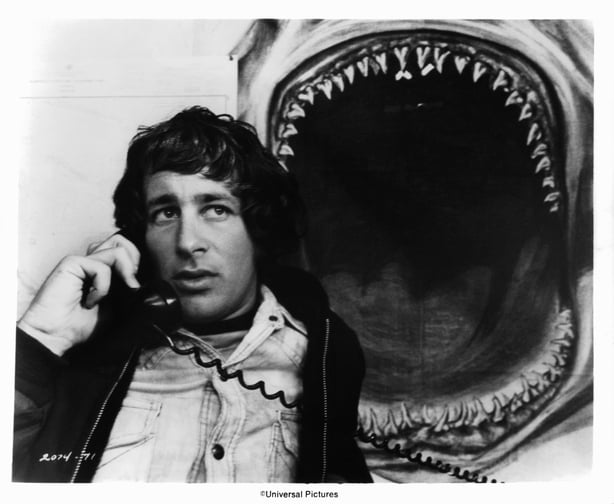Filmmaker Ken O’Sullivan talks about an Irish-led research project documenting shark species off the Irish coast. He explodes damaging myths about sharks and explains the role of sharks in the maritime ecosystem. Listen back above.
One in a billion. Those are the chances of being devoured by a great white shark in Irish waters, according to filmmaker and underwater cameraman Ken O’Sullivan.
Speaking on Today with Claire Byrne, Ken recalls the statistics on fatalities from his 2019 book Stories From the Deep: Reflections on a Life Exploring Ireland’s North Atlantic Waters:
"There are six or seven people taken by sharks every year. About four of them are great whites. If we say a quarter of all people on earth go into the sea twice a year, that’s two billion people swim twice a year – four billion swims and about four are taken by great whites, that’s a billion to one chance."
With no confirmed sightings of great whites in Irish waters, the chances are even slimmer, Ken says. The rarity of the species hasn’t stopped him from spending years searching for the legendary beasts and Claire asks him if he thinks great white sharks will be found somewhere off the Irish coast?
Ken says it's possible, as they can survive in temperate waters like those around our shores, so he remains hopeful:
"Absolutely, there’s every chance. You know, I’d love to meet one, Claire. I’ve spent a lot of the last 20 years in the ocean trying to encounter one. I’ve gone to great lengths – sadly not yet."
Ken recalls a search for great white sharks near the resting place of the Lusitania. The project sent down an ROV (remotely operated vehicle) to the site of the wreck off the Old Head of Kinsale. No great whites were found, but Ken is hoping that a new research group led by a scientist from Trinity College Dublin will finally document the presence of great white sharks in Irish waters.
The word 'shark’ usually conjures up sounds of screaming and images of severed limbs and blood in the water. Much of this goes back to the fear generated by Stephen Spielberg's 1975 movie Jaws. Ken says he’s a big fan of Jaws - in fact, as a filmmaker, he’s in awe of it. But he believes that the movie has unfairly damaged the reputation of great white sharks; something that the film’s director has come to regret:
"Spielberg came out a few years ago himself and apologised for the harm that Jaws had done, for the prejudice that it had generated against sharks."
A robotic shark stood in for a real great white in the filming of Jaws - it turns out real sharks can't be trained – who knew? The robot shark was, by all accounts, pretty terrible; so Spielberg pivoted to using horror-inspired cinematography instead, keeping the fake shark out of the movie as much as possible, as Ken explains:
"They had to change to whole filmmaking style to an Alfred Hitchcock implied sense of fear. So if you watch the movie, you don’t see the great white. You don’t actually see the shark until about 50 or 55 minutes in because it wasn’t scary."
Peter Benchley, screenwriter and author of the novel on which Jaws was based, changed his mind about sharks after an underwater encounter with a great white, Ken says.
After hyping up the dangers of sharks for years, Benchley says that when he actually looked a shark in the eye at close range, he could understand if the shark would want to settle the score:
"Benchley was scuba diving in the Bahamas not long after Jaws the movie came out. And he turned around and found himself face to face with a great white. And he was honest enough to say, ‘If this animal took me now, it would be natural justice’."

The shark had no interest in harming Benchley and they both survived the encounter. The experience turned the writer into an advocate for the great white shark:
"He realised that it was a beautiful, sensitive animal that looked at him for a while and took off. Eventually, the author of Jaws spent the rest of his life as a shark conservationist, making documentaries and writing books. "
Ken believes the media need to tell the truth about sharks, not least because they are critical to a balanced maritime ecosystem. Despite some favourable reports, Ken says that "fake news" stories about the dangers of sharks can capture the imagination on a slow news day. Ken mentions a recent report from Galway that used an Australian shark video; giving readers the impression that there were marauding sharks off the west coast of Ireland. In fact, the notion of a man-hunting rogue shark is a myth, Ken says:
"I can find no credible record of anybody being attacked by a shark in the waters around Ireland."
If sharks have no source of food, they won’t be coming for us, they will just die out, leaving a gaping hole in the ecosystem, Ken says:
"Sharks are what scientists call an apex predator, or a keystone species. Their presence is a sign of a healthy, functioning ecosystem and the reverse – obviously their absence – shows the opposite."
You can watch Ken O’Sullivan’s North Atlantic: The Dark Ocean on RTÉ Player here.
